This memorandum summarises the assets chargeable and non-chargeable for UK Inheritance Tax (IHT), distinguishing between UK-domiciled (or deemed-domiciled) individuals and non-UK-domiciled individuals.
1. Overview
UK Inheritance Tax (IHT) applies based on domicile, not merely residence. UK-domiciled or deemed-domiciled individuals are taxed on worldwide assets, while non-UK-domiciled individuals are taxed only on UK-situated assets.
2. UK-Domiciled or Deemed-Domiciled Individuals
Chargeable Assets (Worldwide Scope):
• Real property (UK and overseas)
• Bank accounts and cash (UK and overseas)
• Investments, shares, bonds, crypto-assets
• Business assets and goodwill
• Personal possessions (art, jewellery, etc.)
• Trust interests and life policies not in trust
Common Non-Chargeable / Exempt Assets:
• Excluded property trusts
• Pension rights and death-in-service benefits
• Transfers to UK-domiciled spouses/civil partners
• Gifts to UK-registered charities
• Business Relief and Agricultural Relief assets
3. Non-UK-Domiciled Individuals
Chargeable (UK-Situs) Assets:
• UK land and buildings
• Shares in UK-incorporated companies
• Interests in UK partnerships
• UK bank accounts for business/investment purposes
• UK government securities (gilts)
• Tangible assets and chattels located in the UK
• UK life assurance policies
• Loans and partnerships linked to UK property
Excluded (Non-Chargeable) Assets:
• Overseas property and investments
• Foreign bank accounts held personally
• Shares in non-UK companies (unless property-rich)
• Offshore investment portfolios
• Excluded property trusts
• Tangible assets located outside the UK
• Foreign life insurance policies
4. Deemed Domicile Rules
An individual is deemed domiciled if they have been UK resident for at least 15 of the previous 20 tax years, or if they are a formerly domiciled resident (born in the UK with UK domicile of origin and resident recently).
5. Planning Considerations
• Review domicile and deemed domicile exposure
• Use excluded property trusts for non-doms
• Avoid UK-sourced loans secured on UK property
• Review Business Relief eligibility
• Consider life insurance policies in trust
• Obtain professional valuations and maintain documentation
6. Summary Table
| Asset Type | UK-Domiciled / Deemed-Domiciled | Non-UK-Domiciled | Reliefs / Exemptions |
| UK property | Chargeable | Chargeable | May qualify for Business or Agricultural Relief |
| Overseas property | Chargeable | Excluded | N/A |
| UK company shares | Chargeable | Chargeable | Business Relief (if trading) |
| Overseas company shares | Chargeable | Excluded (unless property-rich) | N/A |
| UK bank accounts | Chargeable | Excluded if personal non-resident account | N/A |
| Foreign bank accounts | Chargeable | Excluded | N/A |
| UK personal chattels | Chargeable | Chargeable | N/A |
| Overseas chattels | Chargeable | Excluded | N/A |
| Pension assets | Usually excluded | Usually excluded | N/A |
| Excluded property trusts | Not excluded | Excluded | Applies only to non-domiciled settlors |
| Life policies in trust | Excluded | Excluded | Exempt if properly settled |
| Business assets (trading) | Chargeable | Chargeable | 100% or 50% Business Relief |
7. Conclusion
For UK-domiciled individuals, all worldwide assets are within scope of IHT. For non-domiciled individuals, only UK-situated assets are chargeable. Strategic use of excluded property trusts and reliefs can mitigate exposure.
Worried About Inheritance Tax Liabilities? Our tax consultants in London can help you identify chargeable and exempt assets and optimise your IHT planning. Schedule Your Consultation Today!
Prepared by:
Pat Sharma, MSc FCCA
Director | Tax & Audit Consultant
Brayan & Spencer Associates Ltd

